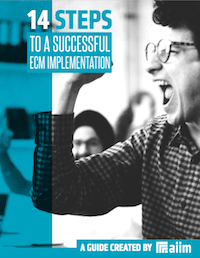The AIIM Blog
Keep your finger on the pulse of Intelligent Information Management with industry news, trends, and best practices.
Intelligent Information Management (IIM)
AIIM's online community always has a lot of great discussion going on. On the community site, users of all levels can connect, learn, and share. It's a great place to post an opinion or ask a question. Below, I've compiled some of my favorite recent posts from Intelligent Information Professionals. These topics range from Big Data, to enterprise file sync and share, to change management, and more. Enjoy! Records and Information Management in Big Data By Dennis Kempner Organizations, both large and small, are burdened with a high volume of data to store. In order to efficiently run a company, important data must be accessible, manageable, and easily retrievable. The phrase “Big Data” refers to information and data that is too large for companies to manage and process on their own. Big Data is valuable for companies in that it can help to determine and fulfill customer needs, thereby maximizing a company’s operational efficiencies. Companies with a lot of data need a team of professionals to manage this information. One effective solution to manage big data is Records and Information Management (RIM). Full article HERE - Records and Information Management in Big Data
Share
Enterprise Content Management (ECM) | Intelligent Information Management (IIM)
Looking back over the past 15 years since its inception, what ECM means within our industry has radically changed. Today we know that successful ECM implementation is less about technology and more about the convergence of people and processes with technological tools.
Share

Making an ECM implementation successful requires planning and attention to detail. The best way to create the right solution is to identify organizational goals and priorities. Learn how to manage a successful implementation in our free guide.
Enterprise Content Management (ECM) | Intelligent Information Management (IIM)
I recently read David McCullough’s The Wright Brothers. Before delving into my curious connection between the Wright Brothers and content management, let me put my reviewer hat on – it’s a very good book. I’ve always had an interest in the Wright Brothers for many reasons, but especially because their breakthrough occurred on the Outer Banks of North Carolina, one of my favorite places in the world. Also, true confessions, I was a history major.
Share
Enterprise Content Management (ECM) | Intelligent Information Management (IIM)
The challenge of managing the intersection of people, processes, and information is not a new one. However, the technologies and the timeframes that we use to manage this intersection DO change, and we are currently in the middle of a phase of high disruption and uncertainty.
Share
Intelligent Information Management (IIM) | Process Improvement
We've been interviewing the sponsors of the upcoming AIIM Conference for their predictions for the future of the industry, a preview of the conference, and a look at some of the biggest challenges facing information professionals right now. Here, I sat down with Dave White, Chief Technology Officer at Quark, to chat about content processes.
Share
Big Data | Digital Transformation | Intelligent Information Management (IIM)
As we start to think about #AIIM15, I thought I would ask a number of our sponsors a few identical questions in order to get an understanding of how they see the future of our industry -- and let those of you attending start to think about your own questions to ask them in San Diego. Here are the three questions I'll ask: What are the three biggest challenges you see your customers facing while trying to “Embrace the Chaos”? What do you see as the three most important trends related to Information Management facing organizations over the next 18-24 months? What will be different in our industry two years from now? What are the three most important things attendees should know about your company?
Share